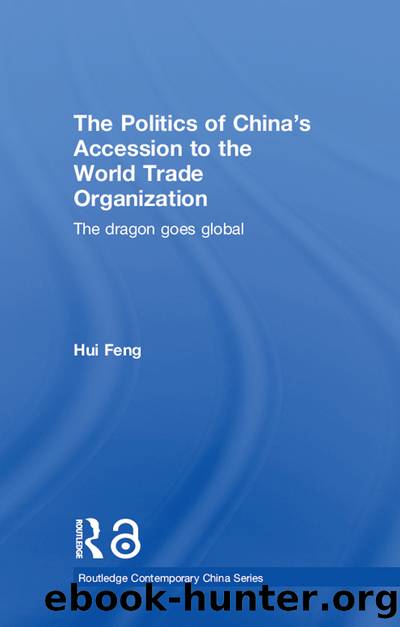The Politics of China's Accession to the World Trade Organization: The Dragon Goes Global by unknow

Author:unknow
Language: eng
Format: epub
Tags: International Relations, Ethnic Studies, Black Studies (Global), Social Science, Political Science, NGOs (Non-Governmental Organizations), Regional Studies, General
ISBN: 9780415369213
Google: Ab-FXgsUIu4C
Goodreads: 3723338
Publisher: Routledge
Published: 2000-01-01T00:00:00+00:00
Keeping up the momentum
Apart from weathering the domestic debate and rebuffing bureaucratic resistance, Chinese leaders have also managed to keep up the momentum of GATT/WTO accession throughout the process.
The initial decision to join the world trade regime was made by Deng Xiaoping and Zhao Ziyang in 1986 after the then GATT director-general Linden and Dunkelâs visits in 1984, 1985 and 1986 (Jacobson and Oksen berg 1990: 87â92). However, ideological rigidity was a great obstacle to Chinaâs GATT bid in the 1980s and the early 1990s. The concept of âmarket economyâ was still forbidden. Instead, the nature of the transitional economy was officially described as âa combination of planning economy and market adjustmentâ, and later âplanned commodity economyâ. This generated great confusion among foreign negotiators during the review of Chinaâs foreign trade regime, an essential step before bilateral negotiations can be carried out. The Americans put it directly: âWe only know about two economic regimes in the world, one is the planning economy, the other one is market economy. We never heard of âcommodity economyâ â (Wen 2002). The Chinese delegation tried to explain the nature of Chinaâs economic and trade regime, but their Chinese political jargon only made their counterparts more frustrated. The economic retrenchment after 1989 further increased the foreign suspicion about the nature and direction of the Chinese reform. The then Director-General of GATT, Arthur Dunkel, told Chinese chief negotiator, Mr Shen Jueren: âThe biggest challenge you are facing is to convince your counterparts with facts that the reform and opening up policy is irreversible.â
Crucially, the ideological breakthrough could only be made from the top. During Deng Xiaopingâs âspring-tourâ to south-east China in 1992, the paramount leader urged Chinese officials to abandon orthodox thinking about plan and market according to the communist doctrine. He claimed that both plan and market are means, not ends, to economic development, and that market mechanism can also be utilized by socialism. Dengâs series of talks broke the ideological iceberg and economic retrenchment after the 1989 crackdown, and stimulated a new wave of liberal reform programmes. At the following fourteenth Party Congress in October, China formally announced that the aim of economic reform was to build a âSocialist Market Economyâ, which became part of the constitution in 1993. On the twelfth Working Party meeting held at the same time in Geneva, Chinese delegates finally found the common language of âmarket economyâ, which produced an overwhelming effect among negotiating parties. The reviewing process of Chinaâs trade regime was finalized at the meeting. Tong Zhiguang, then head of the Chinese delegation, admitted that Chinaâs responses to the questions posed by the contracting parties could not be passed without the âtheoretical breakthroughâ by Deng and the Party Congress (Beijing Morning Post 11 November 2001). Chinaâs chief negotiator Long Yongtu made it clearer: âwe negotiated six years just for the four charactersâ (in Chinese, âmarket economyâ (shichang jingji) is composed of four characters).
The Chinese leadership also generated the momentum of accession through so-called âsummit diplomacyâ. For example,
Download
This site does not store any files on its server. We only index and link to content provided by other sites. Please contact the content providers to delete copyright contents if any and email us, we'll remove relevant links or contents immediately.
What's Done in Darkness by Kayla Perrin(26619)
The Fifty Shades Trilogy & Grey by E L James(19100)
Shot Through the Heart: DI Grace Fisher 2 by Isabelle Grey(19081)
Shot Through the Heart by Mercy Celeste(18955)
Wolf & Parchment: New Theory Spice & Wolf, Vol. 10 by Isuna Hasekura and Jyuu Ayakura(17139)
Python GUI Applications using PyQt5 : The hands-on guide to build apps with Python by Verdugo Leire(17026)
Peren F. Statistics for Business and Economics...Essential Formulas 3ed 2025 by Unknown(16899)
Wolf & Parchment: New Theory Spice & Wolf, Vol. 03 by Isuna Hasekura and Jyuu Ayakura & Jyuu Ayakura(16840)
Wolf & Parchment: New Theory Spice & Wolf, Vol. 01 by Isuna Hasekura and Jyuu Ayakura & Jyuu Ayakura(16470)
The Subtle Art of Not Giving a F*ck by Mark Manson(14384)
The 3rd Cycle of the Betrayed Series Collection: Extremely Controversial Historical Thrillers (Betrayed Series Boxed set) by McCray Carolyn(14158)
Stepbrother Stories 2 - 21 Taboo Story Collection (Brother Sister Stepbrother Stepsister Taboo Pseudo Incest Family Virgin Creampie Pregnant Forced Pregnancy Breeding) by Roxi Harding(13677)
Scorched Earth by Nick Kyme(12788)
Drei Generationen auf dem Jakobsweg by Stein Pia(10984)
Suna by Ziefle Pia(10903)
The Ultimate Python Exercise Book: 700 Practical Exercises for Beginners with Quiz Questions by Copy(10552)
D:\Jan\FTP\HOL\Work\Alien Breed - Tower Assault CD32 Alien Breed II - The Horror Continues Manual 1.jpg by PDFCreator(10531)
De Souza H. Master the Age of Artificial Intelligences. The Basic Guide...2024 by Unknown(10493)
Scythe by Neal Shusterman(10368)
